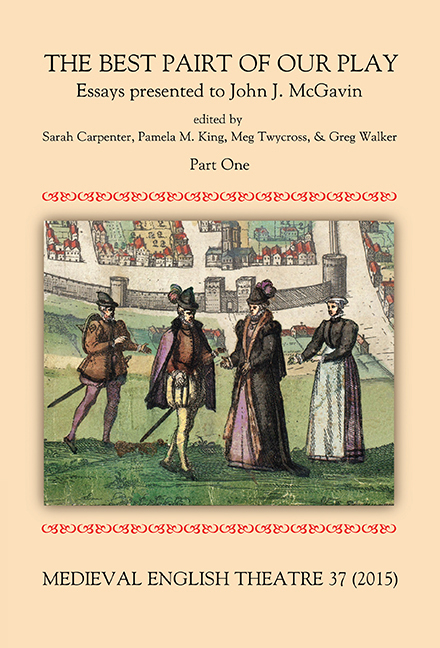Book contents
- Frontmatter
- Contents
- Epigraph
- Editorial
- In honorem John J. McGavin
- John J. McGavin: Bibliography
- The Places of Foolery: Robert Armin and fooling in Edinburgh
- George Bannatyne's ‘Sertane Mirry Interludis’, and Sir David Lyndsay's play
- The Linlithgow Interlude of 1540 and Lyndsay's Satire of the Thrie Estaitis
- Stage Directions in Lyndsay's Ane Satire of the Thrie Estaits
- The Dramatic Voice of William Dunbar
- How to Track a Bear in Southwark: a learning module
- The Digby Mary Magdalen in Performance: a merry peripeteia
- ‘Thus am I Rent on Rode’: taking apart the Towneley Crucifixion
- The Second Shepherds' Play: a play for the Christmas season
- ‘They did not come out of an Abbey in Lancashire’: Francis Douce and the manuscript of the Towneley Plays
- EDITORIAL BOARD (2015)
The Second Shepherds' Play: a play for the Christmas season
Published online by Cambridge University Press: 05 March 2016
- Frontmatter
- Contents
- Epigraph
- Editorial
- In honorem John J. McGavin
- John J. McGavin: Bibliography
- The Places of Foolery: Robert Armin and fooling in Edinburgh
- George Bannatyne's ‘Sertane Mirry Interludis’, and Sir David Lyndsay's play
- The Linlithgow Interlude of 1540 and Lyndsay's Satire of the Thrie Estaitis
- Stage Directions in Lyndsay's Ane Satire of the Thrie Estaits
- The Dramatic Voice of William Dunbar
- How to Track a Bear in Southwark: a learning module
- The Digby Mary Magdalen in Performance: a merry peripeteia
- ‘Thus am I Rent on Rode’: taking apart the Towneley Crucifixion
- The Second Shepherds' Play: a play for the Christmas season
- ‘They did not come out of an Abbey in Lancashire’: Francis Douce and the manuscript of the Towneley Plays
- EDITORIAL BOARD (2015)
Summary
Some years ago, I suggested that there is a recognisable sub-genre of English biblical drama — the Easter play that was neither part of the liturgy nor part of a Creation to Doomsday cycle. More recently I have become convinced that there was also a genre of Christmas plays performed during the feast-days of the Twelve Days of Christmas.
Over the last decade I have been involved in the debate over the nature of the plays contained in the so-called N.Town manuscript and the Towneley manuscript. Recently I have suggested that, in the N.Town manuscript, we have a series of ‘stand-alone’ plays for the Christmas season — the Nativity, the Shepherds, and a complex four-part play on Herod. The emergence of the Herod play has been the most exciting discovery of my work on the N.Town manuscript. If we remove the beautiful and gentle Candlemas play which the main scribe of that manuscript has simply inserted into an already well-made play, we find that we have a chilling rendition of the story of Herod and the Massacre of the Innocents that changes all one has been led to believe about genres in medieval English biblical drama. It presents us with a powerful morality play built on biblical characters that moves from the vaunting of Herod in the opening lines to the exultation of Death as Herod is carried to Hell at the end in a macabre Dance of Death. For too long, taught that plays based on biblical stories are pious, didactic, and performed by urban people for urban people as an act of devotion, we have been unable to recognise the use of biblical stories for any other reason but purposeful didacticism within the sweep of salvation history as they are presented in the Creation to Doomsday arrangement of the plays from York and Chester. We must free ourselves from the misunderstandings of past scholarship and accept that the N.Town and Towneley manuscripts are anthologies that have preserved (albeit obscurely in the case of N.Town) many different types of biblical drama and try to understand the genius of the ‘stand-alone’ biblical plays as well as the plays originally grouped in short sequences and the place they played in late medieval England.
- Type
- Chapter
- Information
- Medieval English Theatre 37The Best Pairt of our Play. Essays presented to John J. McGavin. Part I, pp. 134 - 148Publisher: Boydell & BrewerPrint publication year: 2015



